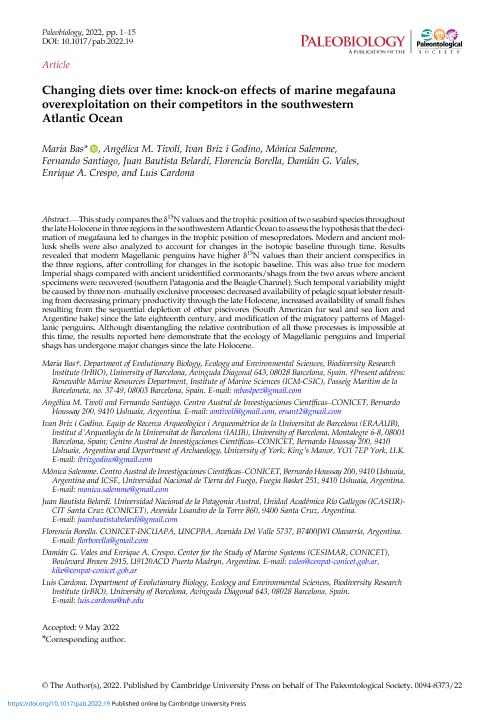Mostrar el registro sencillo del ítem
dc.contributor.author
Bas, Maria
dc.contributor.author
Tivoli, Angelica Montserrat

dc.contributor.author
Briz Godino, Ivan

dc.contributor.author
Salemme, Monica Cira

dc.contributor.author
Santiago, Fernando Carlos

dc.contributor.author
Belardi, Juan Bautista

dc.contributor.author
Borella, Florencia

dc.contributor.author
Vales, Damián Gustavo

dc.contributor.author
Crespo, Enrique Alberto

dc.contributor.author
Cardona, Luis
dc.date.available
2023-04-17T12:10:53Z
dc.date.issued
2022-06
dc.identifier.citation
Bas, Maria; Tivoli, Angelica Montserrat; Briz Godino, Ivan; Salemme, Monica Cira; Santiago, Fernando Carlos; et al.; Changing diets over time: knock-on effects of marine megafauna overexploitation on their competitors in the South-Western Atlantic Ocean; Paleontological Society; Paleobiology; 49; 1; 6-2022; 176-190
dc.identifier.issn
0094-8373
dc.identifier.uri
http://hdl.handle.net/11336/194064
dc.description.abstract
This study compares the δ15N values and the trophic position of two seabird species throughout the late Holocene in three regions in the southwestern Atlantic Ocean to assess the hypothesis that the decimation of megafauna led to changes in the trophic position of mesopredators. Modern and ancient mollusk shells were also analyzed to account for changes in the isotopic baseline through time. Results revealed that modern Magellanic penguins have higher δ15N values than their ancient conspecifics in the three regions, after controlling for changes in the isotopic baseline. This was also true for modern Imperial shags compared with ancient unidentified cormorants/shags from the two areas where ancient specimens were recovered (southern Patagonia and the Beagle Channel). Such temporal variability might be caused by three non-mutually exclusive processes: decreased availability of pelagic squat lobster resulting from decreasing primary productivity through the late Holocene, increased availability of small fishes resulting from the sequential depletion of other piscivores (South American fur seal and sea lion and Argentine hake) since the late eighteenth century, and modification of the migratory patterns of Magellanic penguins. Although disentangling the relative contribution of all those processes is impossible at this time, the results reported here demonstrate that the ecology of Magellanic penguins and Imperial shags has undergone major changes since the late Holocene.
dc.format
application/pdf
dc.language.iso
eng
dc.publisher
Paleontological Society

dc.rights
info:eu-repo/semantics/openAccess
dc.rights.uri
https://creativecommons.org/licenses/by-nc-sa/2.5/ar/
dc.subject
IMPERIAL SHAG
dc.subject
MAGELLANIC PENGUIN
dc.subject
MARINE ECOSYSTEM
dc.subject
STABLE ISOTOPES
dc.subject
ZOOARCHAEOLOGY
dc.subject.classification
Arqueología

dc.subject.classification
Historia y Arqueología

dc.subject.classification
HUMANIDADES

dc.title
Changing diets over time: knock-on effects of marine megafauna overexploitation on their competitors in the South-Western Atlantic Ocean
dc.type
info:eu-repo/semantics/article
dc.type
info:ar-repo/semantics/artículo
dc.type
info:eu-repo/semantics/publishedVersion
dc.date.updated
2023-04-17T11:02:42Z
dc.journal.volume
49
dc.journal.number
1
dc.journal.pagination
176-190
dc.journal.pais
Estados Unidos

dc.journal.ciudad
Lawrence
dc.description.fil
Fil: Bas, Maria. Universidad de Barcelona; España
dc.description.fil
Fil: Tivoli, Angelica Montserrat. Consejo Nacional de Investigaciones Científicas y Técnicas. Centro Austral de Investigaciones Científicas; Argentina
dc.description.fil
Fil: Briz Godino, Ivan. Consejo Nacional de Investigaciones Científicas y Técnicas. Centro Austral de Investigaciones Científicas; Argentina. University of York; Reino Unido
dc.description.fil
Fil: Salemme, Monica Cira. Consejo Nacional de Investigaciones Científicas y Técnicas. Centro Austral de Investigaciones Científicas; Argentina
dc.description.fil
Fil: Santiago, Fernando Carlos. Consejo Nacional de Investigaciones Científicas y Técnicas. Centro Austral de Investigaciones Científicas; Argentina
dc.description.fil
Fil: Belardi, Juan Bautista. Universidad Nacional de la Patagonia Austral. Unidad Académica Río Gallegos; Argentina. Consejo Nacional de Investigaciones Científicas y Técnicas; Argentina
dc.description.fil
Fil: Borella, Florencia. Consejo Nacional de Investigaciones Científicas y Técnicas. Centro Científico Tecnológico Conicet - Tandil. Investigaciones Arqueológicas y Paleontológicas del Cuaternario Pampeano. Universidad Nacional del Centro de la Provincia de Buenos Aires. Investigaciones Arqueológicas y Paleontológicas del Cuaternario Pampeano; Argentina
dc.description.fil
Fil: Vales, Damián Gustavo. Consejo Nacional de Investigaciones Científicas y Técnicas. Centro Científico Tecnológico Conicet - Centro Nacional Patagónico. Centro para el Estudio de Sistemas Marinos; Argentina
dc.description.fil
Fil: Crespo, Enrique Alberto. Consejo Nacional de Investigaciones Científicas y Técnicas. Centro Científico Tecnológico Conicet - Centro Nacional Patagónico. Centro para el Estudio de Sistemas Marinos; Argentina
dc.description.fil
Fil: Cardona, Luis. Universidad de Barcelona; España
dc.journal.title
Paleobiology

dc.relation.alternativeid
info:eu-repo/semantics/altIdentifier/url/https://www.cambridge.org/core/journals/paleobiology/article/changing-diets-over-time-knockon-effects-of-marine-megafauna-overexploitation-on-their-competitors-in-the-southwestern-atlantic-ocean/D32BEF1826029FAD6008853D0E44CB4A
dc.relation.alternativeid
info:eu-repo/semantics/altIdentifier/doi/http://dx.doi.org/10.1017/pab.2022.19
Archivos asociados
